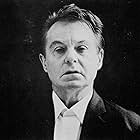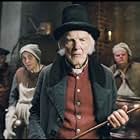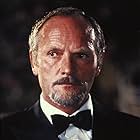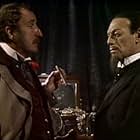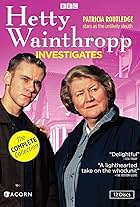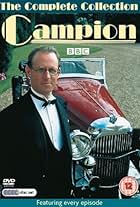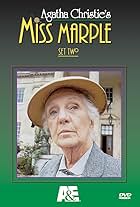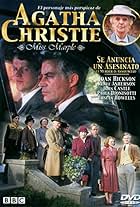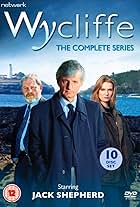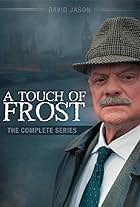The medieval era cases of a Crusader-turned-Monk who investigates mysteries in the Norman English town of Shrewsbury.The medieval era cases of a Crusader-turned-Monk who investigates mysteries in the Norman English town of Shrewsbury.The medieval era cases of a Crusader-turned-Monk who investigates mysteries in the Norman English town of Shrewsbury.
Browse episodes
Storyline
Did you know
- TriviaSeveral of the names and occupations of the monks in the series are actually from a record book from the Abbey of St. Peter and St. Paul in Shrewsbury, England. Some of these include Cadfael, Robert, Jerome, and Heribut.
- GoofsFemale characters are invariably exquisitely made up with the most modern tones of foundation, blusher and lipstick. After HD was introduced this became more noticeable.
- ConnectionsFeatured in Drama Trails: 'Secret Diary of a Call Girl' to 'London's Burning' (2008)
Featured review
Cadfael is a medieval detective series set in mid-12th Century Shrewsbury against the backdrop of a devastating civil war. It is based on the entertaining and popular series of novels by Ellis Peters, the pseudonym of Edith Pargeter. The protagonist is a Benedictine monk, Brother Cadfael, the crusader-turned-herbalist at the monastery of St. Peter and St. Paul, who finds that the only way to get justice for the corpses that come under his care is to investigate the murders himself.
Many of the intricacies and sub-plots that brought such life to the source material are cut out to fit the stories into 75 minutes. Only 13 episodes of the 20 available books were filmed, which is a shame, although from reading the entire series I would say that arguably the best stories got through. The adaptations are good despite their limitations, but it is noticeable when the original (and superior) dialogue is used. The sets and costumes look great and the Hungarian location is a more than adequate substitute. The authenticity in the series is much higher than in most films set in the era.
The role of Brother Cadfael is played brilliantly by Sir Derek Jacobi, who delivers a performance that really brings out the different facets of the complex character of a former crusader and sailor who settles for a quiet life in a monastery. Though he was not the first choice for the role, it is hard to see how anyone could have improved upon his work except to perhaps bring out more of the Welshman in him. The support is mostly excellent, with actors such as Terence Hardiman, Julian Firth, Michael Culver etc. turning in memorable performances. It is a shame that they could not have had more consistent casting of law man Hugh Beringar and it is not just the actor that changed – he went from being a level-headed and intelligent man in the Sean Pertwee era to someone who believed in testing guilt by throwing the accused in a river during the Anthony Green phase! Unfortunately occasionally there is some unintentional hilarity from the poor dubbing of the Hungarian extras.
Cadfael is worth seeking out if for no other reason than because it is a refreshing change from the CSI-type mysteries that fill our screens, with a different setting and a focus on knowledge of human behaviour rather than forensics (though Cadfael is well ahead of his time in the latter discipline!).
Many of the intricacies and sub-plots that brought such life to the source material are cut out to fit the stories into 75 minutes. Only 13 episodes of the 20 available books were filmed, which is a shame, although from reading the entire series I would say that arguably the best stories got through. The adaptations are good despite their limitations, but it is noticeable when the original (and superior) dialogue is used. The sets and costumes look great and the Hungarian location is a more than adequate substitute. The authenticity in the series is much higher than in most films set in the era.
The role of Brother Cadfael is played brilliantly by Sir Derek Jacobi, who delivers a performance that really brings out the different facets of the complex character of a former crusader and sailor who settles for a quiet life in a monastery. Though he was not the first choice for the role, it is hard to see how anyone could have improved upon his work except to perhaps bring out more of the Welshman in him. The support is mostly excellent, with actors such as Terence Hardiman, Julian Firth, Michael Culver etc. turning in memorable performances. It is a shame that they could not have had more consistent casting of law man Hugh Beringar and it is not just the actor that changed – he went from being a level-headed and intelligent man in the Sean Pertwee era to someone who believed in testing guilt by throwing the accused in a river during the Anthony Green phase! Unfortunately occasionally there is some unintentional hilarity from the poor dubbing of the Hungarian extras.
Cadfael is worth seeking out if for no other reason than because it is a refreshing change from the CSI-type mysteries that fill our screens, with a different setting and a focus on knowledge of human behaviour rather than forensics (though Cadfael is well ahead of his time in the latter discipline!).
Details
Contribute to this page
Suggest an edit or add missing content
















